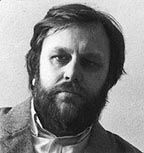|
June 26, 2000 Mission:
Implausible Trading
Places Africa
in Agony Radio
Free Burundi Germany's
New Identity Editorial Appall-O-Meter Mr.
Clean Clash
of the Titan Roma
Wrongs The
Flanders Files Psychlo
Babble All
Things New Summer
Reading |
By Eugene McCarraher
The Fragile
Absolute—Or Why Is
the Christian Legacy Worth
Fighting For?
By Slavoj Zizek
Verso
182 pages, $25
Perhaps it's an epiphany when Verso, cousin of New Left Review, publishes Slavoj Zizek's The Fragile Absolute, a book on "why the Christian legacy is worth fighting for." A prolific author, electrifying lecturer and senior researcher at the Institute for Social Studies in Ljubljana,
 |
|
Slavoj Zizek.
|
Slovenia, Zizek is an academic rock star in a constellation of Eastern European intellectuals that includes Adam Michnik, Slavenka Drakulic and Vaclav Havel. (Profiled not long ago in an admiring Lingua Franca piece, Zizek also figures in more than 1,600 Web sites, achieving a bona fide postmodern celebrity.) But while Havel, for one, affirms a liberal democratic humanism that gets him on the New York Times opinion page, Zizek writes in a creole of Marxism, Lacanian psychoanalysis and phenomenology.
If Zizek's lexicon is formidable, his erudition is wide and frenetically dispersed. Like other pomo virtuosi, he can write prose that gives anything but jouissance, but he can also enliven everything he touches as he ricochets from his beloved Lacan to Hitchcock to Levi-Strauss to the Marx Brothers. This dazzle has its price: after detours through Marx, Lacan, Hegel and other big names, numerous mini-reviews of Fellini, Spielberg and Kieslowski, and several gratuitous volleys at multiculturalism, we finally get to the "Christian legacy" three-fifths of the way through the book. But Zizek deserves our perseverance, for his mission is nothing less than the intellectual and moral reconstruction of the left, a project that, he contends, demands a serious and even humbling reappraisal of Christianity. "There is a direct lineage from Christianity to Marxism," he argues, and rediscovering it is an urgent ideological and political task.
![]()
|
In These Times ©
2000
Vol. 24, No. 15 |
